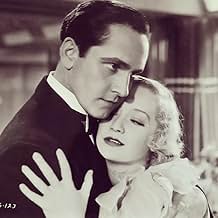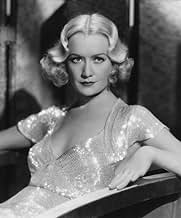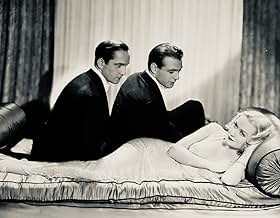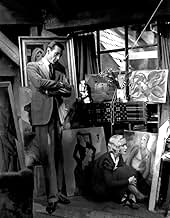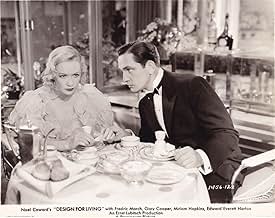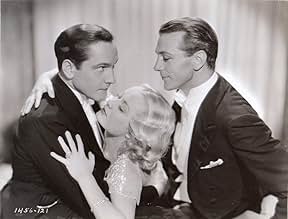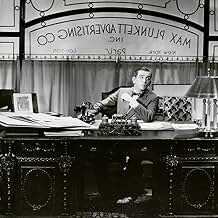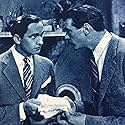VALUTAZIONE IMDb
7,4/10
8269
LA TUA VALUTAZIONE
Aggiungi una trama nella tua linguaA woman cannot decide between two men who love her, and the trio agree to try living together in a platonic friendly relationship.A woman cannot decide between two men who love her, and the trio agree to try living together in a platonic friendly relationship.A woman cannot decide between two men who love her, and the trio agree to try living together in a platonic friendly relationship.
- Regia
- Sceneggiatura
- Star
- Premi
- 3 vittorie totali
Cosmo Kyrle Bellew
- Man
- (non citato nei titoli originali)
Lionel Belmore
- Theatre Patron
- (non citato nei titoli originali)
Thomas Braidon
- Douglas' Second Manager
- (non citato nei titoli originali)
Nora Cecil
- Tom's Secretary
- (non citato nei titoli originali)
Emile Chautard
- Train Conductor
- (non citato nei titoli originali)
Mathilde Comont
- Heavy Woman
- (non citato nei titoli originali)
Adrienne D'Ambricourt
- Cafe Proprietress
- (non citato nei titoli originali)
James Donlan
- Fat Man with Ring
- (non citato nei titoli originali)
Harry Dunkinson
- Mr. Egelbauer
- (non citato nei titoli originali)
Estelle Etterre
- Woman in audience
- (non citato nei titoli originali)
Recensioni in evidenza
10capel
Few films have had as much nonsense written about them as Ernst Lubitsch's "Design For Living." From the moment it was released, it was criticized for rewriting Noel Coward's then-daring play (Ben Hecht, the screenwriter, said: "There's only one line of Coward's left in the picture--see if you can find it!"); for casting Americans in parts that had originally been played by Coward, Alfred Lunt, and Lynn Fontanne; for toning down the gay subtexts of Coward's play. All that is, of course, completely irrelevant; the question is not whether the play is faithful to the source material, but whether it's good. And it is, it is.
There are flaws in the film. This was one of the first times Lubitsch had made a movie with little or no music on the soundtrack; previously, in his musicals and his sublime "Trouble In Paradise," he had used background music to cover up potential dead spots and carry the film along. Here there is none of that, with the result that some of the early scenes seem oddly paced. But the wit of the script (written by Hecht but, as always with Lubitsch, carefully supervised and contributed to by the director himself) and the appeal of the performers (more about them later) pull the film through the occasional rough spots, and the second half of the movie is just about perfect.
Another idiotic thing that is often said about "Design For Living" is that Lubitsch and Hecht rewrote Coward due to fear of the censors. In fact, the censors must have had a heart attack when they saw "Design," for this is one of the most sexually frank of the pre-Code Hollywood movies; premarital sex, cohabitation, adultery and frigidity are all clearly portrayed-- but, as always with Lubitsch, they are implied rather than shown. Lubitsch's trademark door and blackout gags are here, and they are hilarious; again, it's not Noel Coward--it's Lubitsch, the cinema's greatest comic filmmaker at the peak of his powers.
But there's something else here that isn't found in most Lubitsch films, and it comes from Ben Hecht, whose cynical, fast-talking, very American style of writing gives the characters a flavor quite unlike the more Continental wit of Lubitsch's usual heroes. (This is also one of the few Lubitsch films where the lead characters are American rather than European.) Critics have sometimes complained that Hecht's somewhat inelegant style was unworthy of either Coward or Lubitsch. Again, I disagree; the moments of Hechtian farce (like the hilarious party scene) are beautifully handled by Lubitsch and turn the film into a forerunner of screwball comedy, the place where Continental charm and hard-driving Americanism meet.
Now to the actors. The "British is Better" attitude of many critics made it inevitable that Lubitsch's American cast would be pilloried. Again, this is not Noel Coward and a Noel Coward style of acting wouldn't work in this context. All the leading players are actually quite wonderful: Miriam Hopkins, one of Lubitsch's favorite actresses, has the best role and gives a marvelously energetic performance as the flighty, pretentious free spirit who tries to substitute art for sex; Gary Cooper is at the height of his youthful charm, with a surprisingly light comic touch and great teamwork with Fredric March. March, who can often be heavy-handed in film comedy, is here charming and funny; it's a tribute to Lubitsch that he got such a genial performance out of him. And, of course, there's Edward Everett Horton, one of Hollywood's finest character actors in one of his finest roles.
If you know and love the Noel Coward play, don't expect this movie to be a faithful adaptation. Think of it as an original work of comedic art that happens to utilize some of the story elements of Coward's play. It's not Noel Coward; it's a splendid romantic farce that, like all great comedies, has serious themes underneath the fun: Sexual freedom, male vs. female roles in society, art, love, friendship. So see it (if you can; it's not on video, alas). It's not Noel Coward, it's Ernst Lubitsch, and despite the occasional flaws, it's Lubitsch at his best.
There are flaws in the film. This was one of the first times Lubitsch had made a movie with little or no music on the soundtrack; previously, in his musicals and his sublime "Trouble In Paradise," he had used background music to cover up potential dead spots and carry the film along. Here there is none of that, with the result that some of the early scenes seem oddly paced. But the wit of the script (written by Hecht but, as always with Lubitsch, carefully supervised and contributed to by the director himself) and the appeal of the performers (more about them later) pull the film through the occasional rough spots, and the second half of the movie is just about perfect.
Another idiotic thing that is often said about "Design For Living" is that Lubitsch and Hecht rewrote Coward due to fear of the censors. In fact, the censors must have had a heart attack when they saw "Design," for this is one of the most sexually frank of the pre-Code Hollywood movies; premarital sex, cohabitation, adultery and frigidity are all clearly portrayed-- but, as always with Lubitsch, they are implied rather than shown. Lubitsch's trademark door and blackout gags are here, and they are hilarious; again, it's not Noel Coward--it's Lubitsch, the cinema's greatest comic filmmaker at the peak of his powers.
But there's something else here that isn't found in most Lubitsch films, and it comes from Ben Hecht, whose cynical, fast-talking, very American style of writing gives the characters a flavor quite unlike the more Continental wit of Lubitsch's usual heroes. (This is also one of the few Lubitsch films where the lead characters are American rather than European.) Critics have sometimes complained that Hecht's somewhat inelegant style was unworthy of either Coward or Lubitsch. Again, I disagree; the moments of Hechtian farce (like the hilarious party scene) are beautifully handled by Lubitsch and turn the film into a forerunner of screwball comedy, the place where Continental charm and hard-driving Americanism meet.
Now to the actors. The "British is Better" attitude of many critics made it inevitable that Lubitsch's American cast would be pilloried. Again, this is not Noel Coward and a Noel Coward style of acting wouldn't work in this context. All the leading players are actually quite wonderful: Miriam Hopkins, one of Lubitsch's favorite actresses, has the best role and gives a marvelously energetic performance as the flighty, pretentious free spirit who tries to substitute art for sex; Gary Cooper is at the height of his youthful charm, with a surprisingly light comic touch and great teamwork with Fredric March. March, who can often be heavy-handed in film comedy, is here charming and funny; it's a tribute to Lubitsch that he got such a genial performance out of him. And, of course, there's Edward Everett Horton, one of Hollywood's finest character actors in one of his finest roles.
If you know and love the Noel Coward play, don't expect this movie to be a faithful adaptation. Think of it as an original work of comedic art that happens to utilize some of the story elements of Coward's play. It's not Noel Coward; it's a splendid romantic farce that, like all great comedies, has serious themes underneath the fun: Sexual freedom, male vs. female roles in society, art, love, friendship. So see it (if you can; it's not on video, alas). It's not Noel Coward, it's Ernst Lubitsch, and despite the occasional flaws, it's Lubitsch at his best.
Delightful even if more Ben Hecht than Noel Coward. The "menage a trois" has real brains, wit and magic. All due to the sensational chemistry between Gary Cooper, Fredric March, Miriam Hopkins and, of course, the unmistakable Lubitch touch. I was going to say that the film seems written today but the sad truth is there is nobody today that could write with this extraordinary elegance. Frediric March is masculine and volcanic, Gary Cooper feminine and irresistible and Miriam Hopkins, a sensational modern comedienne. As if this wasn't enough, Edward Everett Horton as Mr Wrong. The scene in which Hopkins compares Cooper and March to hats is one of my all time favorites.
This was one of the movies I was so sure was going to be stupid and annoying but it turned out to be such fine comedy I've already watched it three times in the past week or two. So many good lines. Tom writes a play called Goodnight Bassington - a comedy in about three acts with a tragic ending. George paints Lady Godiva on a bicycle, despite the fact that a bicycle seat IS a little hard on her historical background. Gilda says that she went to see the above-mentioned painting of Lady Godiva with a friend. "She loved it. We haven't spoken since," Gilda tells George, who begins to pout. He does a fair amount of pouting throughout the film.
Eaglebauer also makes for some fine humour in some scenes near the end, but we never get to see the man. We only hear him bellowing out a joyous song about "falling leaves and fading trees! Goodbye, summer, goodbye!"
But besides all that this really wacky movie is a delight and I sure wish they'd re-release it because it's so good.
So. There's only one thing I have to say to you. Immorality may be fun, but it's not fun enough to replace one hundred per cent virtue and three square meals a day.
Eaglebauer also makes for some fine humour in some scenes near the end, but we never get to see the man. We only hear him bellowing out a joyous song about "falling leaves and fading trees! Goodbye, summer, goodbye!"
But besides all that this really wacky movie is a delight and I sure wish they'd re-release it because it's so good.
So. There's only one thing I have to say to you. Immorality may be fun, but it's not fun enough to replace one hundred per cent virtue and three square meals a day.
In this surprisingly risqué film made before the Hays code, two men and a woman share an apartment in Paris and talk openly about sex. It's fun to watch, thanks to the witty and sophisticated dialog of Noel Coward, the screenplay by Ben Hecht, and of course the masterful direction of Lubitsch. March is wonderful as a struggling playwright. Hopkins has one of her best roles as a free-loving woman who loves two men but marries a third. Lubitsch elicits a fine comedic performance from Cooper as a hot-tempered artist. In a typical role, Horton plays a stuffed shirt. There's no music, which could make things seem static, but Lubitsch keeps it moving at a breezy pace.
I bought the Gary Cooper collection because of "Design for Living". It didn't disappoint me. This movie is classy, it's full of wit and sexually free. I found the plot intriguing, the set excellent, the costumes fine and Lubitsch inspired together with Ben Hecht (lovely and smart screenplay).
The movie shows 4 actors only, which could be considered its strength if the actors were all good. 1 out of 4 is good and 2 out of 4 are really good. 1 out of 4 has got nothing to do with such environments, dialogs and sophisticated comedy. Gary Cooper does not fit to me. He's a sort of amazing good looking and so dashing statue to look at. Nothing more. He just doesn't look comfortable in acting spoiling intellectual shades. He doesn't work to me.
Miriam Hopkins is good, she's mischievous, charming and funny. She plays the free woman with intelligence, combining sensuality and brain. Audience - even the male one - does understand why she can't choose between the two guys and she conquers it. Every woman would like to be her; that's the message she strongly brought on the screen: being free of living life the way she desires.
Edward Everett Horton is perfect, hilarious and very elegant. He's the right choice to play Plunkett Inc. and he didn't let it down. He IS Plunkett Inc.!
Fredric March is so charming, sophisticated, sexy and so right for Thomas. He does much better here than in other movies (e.g. Anna Karenina) which could seem more suitable for him. He's perfect for Lubitsch so much and his performance is a top one. He's a fine comedian too, he's measured and passionate at the same time and he's really handsome. His sensuality is made up either by intellectual attitude or a physical one.
Don't know why he's been forgotten, a wonderful actor like he is. Can anybody tell me?
I do suggest to get this movie and to enjoy it since it's really a nice touch in our collection. We do need nice and elegant touches. Especially nowadays.
The movie shows 4 actors only, which could be considered its strength if the actors were all good. 1 out of 4 is good and 2 out of 4 are really good. 1 out of 4 has got nothing to do with such environments, dialogs and sophisticated comedy. Gary Cooper does not fit to me. He's a sort of amazing good looking and so dashing statue to look at. Nothing more. He just doesn't look comfortable in acting spoiling intellectual shades. He doesn't work to me.
Miriam Hopkins is good, she's mischievous, charming and funny. She plays the free woman with intelligence, combining sensuality and brain. Audience - even the male one - does understand why she can't choose between the two guys and she conquers it. Every woman would like to be her; that's the message she strongly brought on the screen: being free of living life the way she desires.
Edward Everett Horton is perfect, hilarious and very elegant. He's the right choice to play Plunkett Inc. and he didn't let it down. He IS Plunkett Inc.!
Fredric March is so charming, sophisticated, sexy and so right for Thomas. He does much better here than in other movies (e.g. Anna Karenina) which could seem more suitable for him. He's perfect for Lubitsch so much and his performance is a top one. He's a fine comedian too, he's measured and passionate at the same time and he's really handsome. His sensuality is made up either by intellectual attitude or a physical one.
Don't know why he's been forgotten, a wonderful actor like he is. Can anybody tell me?
I do suggest to get this movie and to enjoy it since it's really a nice touch in our collection. We do need nice and elegant touches. Especially nowadays.
Lo sapevi?
- QuizConsiderable censorship difficulties arose because of sexual discussions and innuendos, although the Hays Office eventually approved the film for release. However, the film was banned by the Legion of Decency and was refused a certificate for re-release by censor Joseph Breen in 1934 when the Production Code was more rigorously enforced.
- BlooperCamera shadow visible on window frame as Gilda sets the table.
- Citazioni
Max Plunkett: Immorality may be fun, but it isn't fun enough to take the place of one hundred percent virtue and three square meals a day.
- ConnessioniFeatured in Complicated Women (2003)
- Colonne sonoreThe Star Spangled Banner
(1814) (uncredited)
Music by John Stafford Smith
Hummed by Gary Cooper and Fredric March
I più visti
Accedi per valutare e creare un elenco di titoli salvati per ottenere consigli personalizzati
Dettagli
- Data di uscita
- Paese di origine
- Lingue
- Celebre anche come
- Una mujer para dos
- Luoghi delle riprese
- Azienda produttrice
- Vedi altri crediti dell’azienda su IMDbPro
Botteghino
- Lordo in tutto il mondo
- 157 USD
- Tempo di esecuzione1 ora 31 minuti
- Colore
- Proporzioni
- 1.33 : 1
Contribuisci a questa pagina
Suggerisci una modifica o aggiungi i contenuti mancanti

Divario superiore
By what name was Partita a quattro (1933) officially released in India in English?
Rispondi

